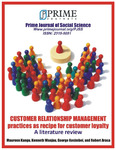| dc.description.abstract | According to empirical evidence the extent of Customer Relationship Management (CRM) benefits to an organization will vary depending on the nature of the business concerned. They are likely to be more substantial in the case of any organization that has some or all of the following characteristics: frequent customer interactions and purchases, high cross-selling potential, perceived risks and involvement, and profitability. Findings from the empirical studies have grouped CRM benefits under two main paradigms: operational and strategic benefits. The review of literature provides insights into the operational and strategic benefits of CRM and how it can be used for strategic advantage of a business. It is advisable that organizations include in their strategic plans the CRM initiatives that they will useto ensure promotion of customer loyalty. It is one thing to plan for growth of business using data extrapolation and forecasting but it is equally important for organizations to plan for ensuring customers are managed professionally. Competition for business has been in the front of financial performance. Majority of global performance rankings of companies are based on financial performance. It is good if professionals and business experts can develop an index for CRM with very clear indicators and measurable processes. The index and its metrics can be used by firms to benchmark their CRM process and seek ways to improve in the areas which they have shortcomings. This will infuse a culture of firm competition based on best practice CRM. | en_US |

